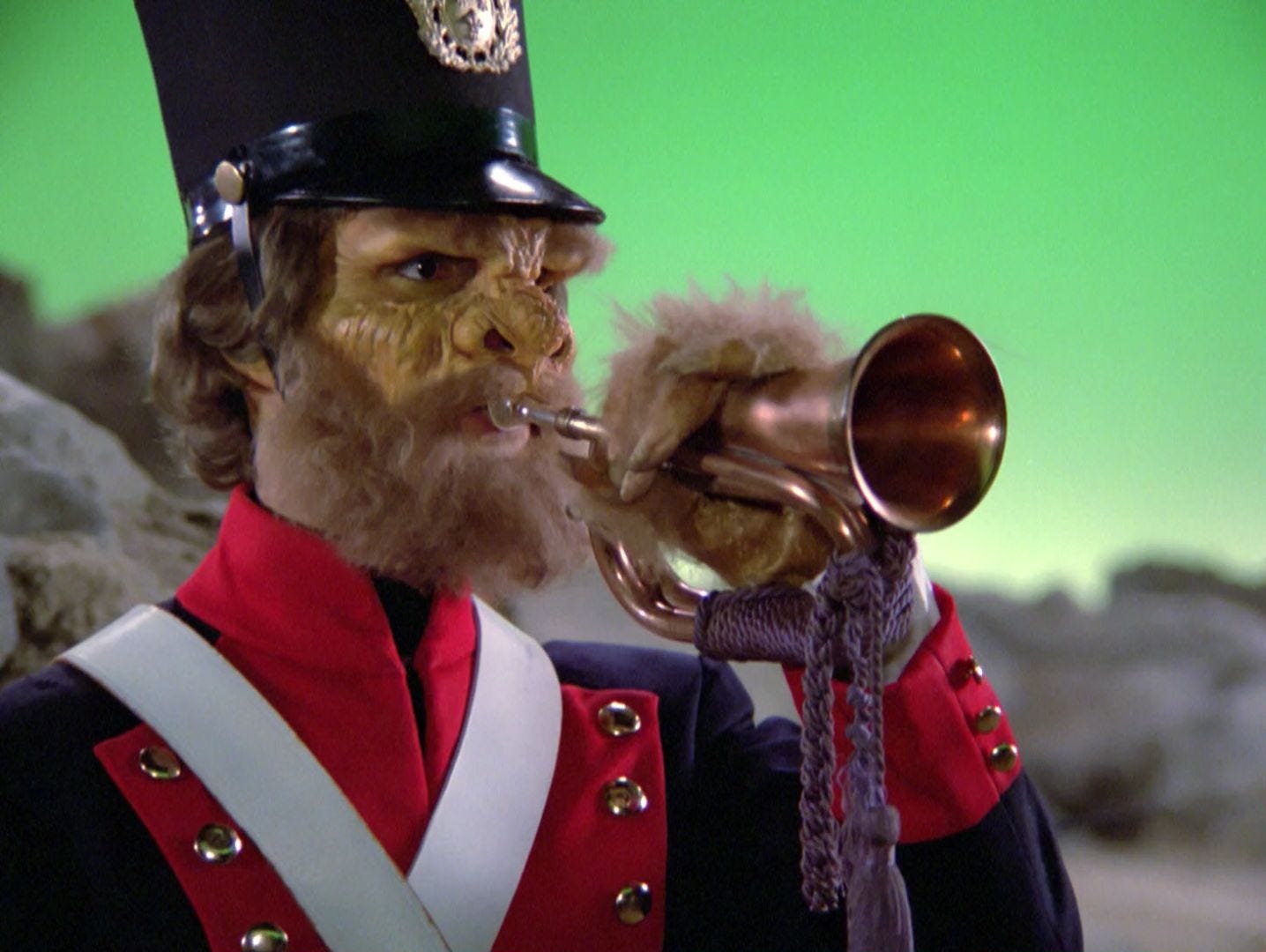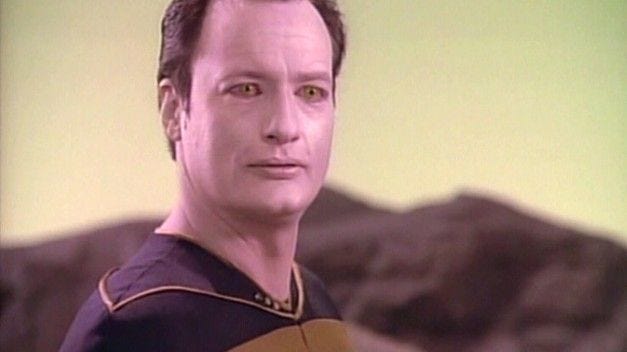Hide and Q
Q gives the crew of the Enterprise the greatest gift of all: he kills Wesley
Remember when I said Q would come back when the scripts had improved? Well apparently he couldn't wait that long. He pops up for some playful sparring with Picard and then whisks the bridge crew off to Sound Stage 16, leaving the captain behind. This week the classic Trek episode we will be rehashing is "Spectre of the Gun", but stripped of the more interesting aspects of the story. At least we get Q as compensation. It seems the Q continuum is concerned that humanity will eventually outstrip its power, which seems rather paranoid for a species with near-unlimited capabilities, although it's very much in keeping with the themes of Roddenberry's Star Trek.
Q sets up an elaborate game with ill-defined rules, and silly Napoleonic 'Animal things' to fight, then gives Riker the power of the Q so that none of that setup matters. But still, after Riker manages to piss off Q, its back to the silly Napoleonic games where Worf gets killed (Worf 0, Aliens 2) and so does Wesley (hooray!) forcing Riker to use the powers he has been given to save everyone’s necks. He promises Picard he won't use them again, then sulks about it until he's given the chance to play the Wizard of Oz and grant everyone their hearts desire... which ends in him giving up his powers, and Q being recalled to the big box of plot devices.
Words
This is the episode that introduces the concept of 'the Q Continuum', which has a rather lovely introduction in the script:
The limitless dimensions of the galaxy in which we exist. We could hardly be capable of acting in ways that seem so astonishing to you if we were limited to the primitive dimensions in which you live, dimensions which would make us prisoners of time and space.
Of course, this is a description with the primary merit of not really pinning down any details beyond 'we can do amazing stuff because we exist outside of time and space'.
But if the Q existed outside of time and space, why does Q opt to keep interacting with the Enterprise crew in a strictly linear sequence? Pragmatically, because trans-temporal story telling is difficult to do well - and impossible to do well on the production schedule of a 1980s TV show, which has to crank out episodes half the weeks of the year. Fanonically, we have all sorts of options to explain away why Q sticks to linearity, because so little is defined in terms of what the Q Continuum is and how it works. Everything is possible and nothing much is off limits... that is the benefit that god-like entities have always brought to Star Trek, but as the franchise's first recurring super-entity, Q brings much more to the table than, say, Trelane in the "The Squire of Gothos".
And hat-tip to Yar's mention of "Shields and deflectors"... you can tell Roddenberry was involved in the writing of this script. I suspect he was the only person for whom that phrase made perfect sense. These terms will crop up a few more times in season one, but by the second season I believe this pairing of words will be gone forever more.
Acting Roles
Pairing John de Lancie's Q with Jonathan Frakes' Riker falls a little flat, but fortunately the script contrives to let Stewart and de Lancie spar theatrically just as they did to great effect in "Encounter at Farpoint". Patrick Stewart was a member of the Royal Shakespeare Company so giving him some of the Bard's scripts to work from is a rather nice touch - something the writing team will enjoy doing several times over the course of the show. Actually, Frakes' performance here is fine, he just doesn't have the on screen chemistry with de Lancie that Stewart's passion provides. Also, 'Smug Q Riker' is a bit much for anyone to take.
The episode is constructed as a solid ensemble piece, with a little something for everyone to do in it, although that's not to say that it's all good. Denise Crosby, for instance, suffers from the twin problems she always faces: she doesn't seem to have much acting skill, and the writing team give her such awful material that she is all too frequently reduced to her sexuality. Why she is coming onto Picard in this episode is a complete mystery...

It's the simple gestures that work best - Worf pouring out his cup of red wine (fanonically blood wine, I suppose), Dr Crusher wanting to remove Wesley from the room before Riker can grant his wish... But for the most part the dialogue in this script, by C. J. Holland and Gene Roddenberry, is clunky and inelegant, which is unfortunate, but par for the course in season one.
Models, Make-up, and Mattes
The 'animal things' are pretty disappointing.
The description in the script is more interesting than the eventual delivery:
Two sentries are walking a perimeter patrol. They are dressed as Bonapartist soldiers, carrying muskets. As they approach, WE SEE their uniforms look genuine enough... but then we make out their faces! Humanoid but with fearsome, fanged, unhuman features.
And what is up with the corridors on the Enterprise this week…? In the teaser we see them shuffling around a silver-patterned corridors that look like they escaped from a 1970s bachelor pad. They look bizarrely out of place if you're a TNG regular! That's because by season 2 this corridor set had been redressed in a more uniform beige, and that's the look we remember when we think of the Enterprise's corridors.
There's a lot of cost-saving reuse of materials. Firstly, a shuffling of the polystyrene rocks on Sound Stage 16 (last seen in "The Last Outpost", where glowing red crystals distracted from the weak set dressing), and secondly the reuse of the stock footage of the bad CGI chain link fence - although compositing it into the live scene is a nice touch.
Finally, there's all the time the special effects department lavished on Q - mostly on a string of outfits, and one short sequence where Q appears with Data's make-up that must have been a real pain, as it was not quick to set up this look (at least with Lore, who we’ll meet in a few weeks time, only one actor had to sit through all the rigmarole).
But perhaps the star Q outfit in this episode is right after the opening credits: the Aldeberan serpent. The description in the script is much more dramatic than what we actually saw - it was supposed to try and attack with "snapping fangs", with Yar and Worf throwing themselves heroically into battle only to discover that phasers have been disabled. That, apparently, was too expensive.
Instead, we get a glowing ball (lots of these in season one) with three snake heads coming out of the top. It's less dramatic, but it's not bad as a throwaway effect, and it does a great job of reminding us that Q isn't human, and is only playing at being one for his own entertainment.












I do love Q. This episode is so close to being really good but it just doesn't quite get there. Better luck next time Q!